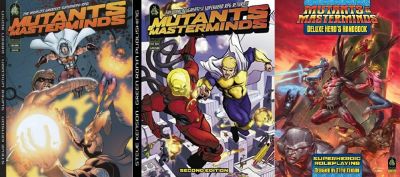My Ten Most Recent Roleplaying Games 2: Third Edition Mutants and Masterminds.

19 Apr, 2021
0 comments
My Ten Most Recent Roleplaying Games 2: Third Edition Mutants and Masterminds.
Inspired by Aaron de Orive's 2020 First Ten RPGs, a brief account of the roleplaying games [RPGs] I have played most recently, beginning with the most recent and working backwards. Number two: Green Ronin’s super-hero roleplaying game, Mutants & Masterminds (M&M).
I’ve been playing M&M off and on since it was first published way back in 2002, a year that is simultaneously futuristic sounding and also 19 years in the past. M&M is just one of many superhero roleplaying games to which I was first introduced by John McMullen. As I understand it, the game’s mechanical roots are in 3rd edition Dungeons and Dragons d20 system but designer Stephen Kenson modified the essentials considerably. There are no character classes as such, for example, and damage in combat is not all or nothing but involves to hit rolls and damage soaks.
M&M allows players to create characters by allocating points to buy characteristics, powers, skills, and other accoutrements according to player taste. In this, it is rather similar to the venerable SHRPG Champions. This may be less due to conscious emulation than because Champions hit on many of the optimum solutions to SHRPG design. Perhaps in reaction to player character design shenanigans in earlier points-based games, M&M chargen is mediated by rules intended to ensure play balance between characters.
My memory of the first edition is that offense and defense were too closely balanced. Consequently, combat was an interminable exercise in ineffectual flailing1. My main memory of second edition involves delightfully easily abused knock-back rules and a foe punted into low Earth orbit. Tragically, third edition, while otherwise quite functional, removed the knockback rules for some reason. Fear of Kessler Syndrome, perhaps.
M&M replaced Champions as our go-to flexible, rules-intensive, points-based-chargen SHRPG for a number of reasons. Firstly, the system is functional and flexible, permitting play that reflects what one sees in the comics2. Secondly, Champions seemed to have settled contently on a greater level of rules complexity than I, at least, wanted to contend with. Thirdly, it was a hell of a lot easier to get my hands on any edition of M&M than it was most versions of Champions post-Hero Games’ mid-1990s contraction. M&M is well supported by its publisher in other ways as well.
1: or maybe it was the character designs that were at fault! It’s been 19 years!
2: “Don’t all RPGs effectively simulate the genres in which they are purportedly set?” Gosh no.
